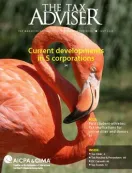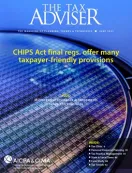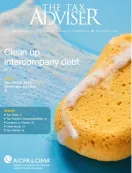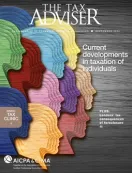Sec. 181 expensing of costs of qualified film, television, and theatrical productions gives producers cause to cheer, but the curtain may be falling on this temporary provision.
Deductions
IRS increases scrutiny of business aircraft use
Businesses that own, lease, or charter aircraft should prepare for increased IRS scrutiny by closely reviewing their compliance with applicable tax provisions.
A closer look at the costs of borrowing
Comparison of the accounting and tax treatment of interest expense may reveal crucial differences and lead to best practices for managing it.
On DRD, the IRS seeks to have its cake and eat it too
The plain language of Sec. 245A disallowed a dividends-received deduction for a controlled foreign corporation, the IRS Office of Chief Counsel held, contrary to the Service’s argument in a recent Tax Court case.
Payments for law violation are not deductible restitution
A recent Chief Counsel Advice memo determined that the deductions were disallowed as fines or penalties under Sec. 162(f).
Prop. regs. address expanded annual compensation deduction limitation
The regulations provide guidance on determining who is one of the “five highest compensated employees” under Sec. 162(m)(3)(C).
Taxpayer may not deduct penalties imposed for violating a law
An IRS technical advice memorandum examines a taxpayer’s fines and penalties paid to a state agency.
Burden of proof: The shoebox method and 9-martini lunch
When taxpayers claim deductions for business expenses, they must meet their burden of proof with proper recordkeeping.
Planning opportunities: Sec. 179 expensing vs. bonus depreciation
As bonus depreciation phases out, practitioners need to consider Sec. 179 expensing to maximize deductions on fixed-asset purchases.
Sec. 245A dividends-received deduction allowed for Sec. 78 dividend
In Varian Medical Systems Inc., the Tax Court found the company eligible for the deduction for 2018 despite a disqualifying change in Sec. 78, due a mismatch between the change’s effective date versus the effective date of then-new Sec. 245A.
Advances between affiliated entities: An uphill but winnable battle for loan characterization
Whether a purported loan between affiliated or commonly controlled entities will be recharacterized as equity can depend on the 13 Mixon factors.
Sec. 163(j) planning considerations
Businesses can explore several options to mitigate the interest deduction limitation under the Tax Cuts and Jobs Act.
Electing the UNICAP historic absorption ratio under the modified simplified production method
To avoid contending with the complex and time-consuming calculations of the uniform capitalization rules under Sec. 263A, taxpayers may want to consider electing the historic absorption ratio with this method.
Regs. cover green energy incentive wage and apprenticeship requirements
Under new final regulations issued by the IRS, taxpayers can generally increase the base amount of certain credits or deductions by five times when they meet prevailing wage and apprenticeship requirements.
Lease termination payments: Considerations for the lessor
The payments are subject to capitalization, but the period and manner are unclear. The 12-month rule under Regs. Sec. 1.263(a)-4(f)(2) may help.
Interim guidance for SRE expenditures
An IRS notice and revenue procedure provide greater clarity on the treatment of specified research or experimental expenditures while practitioners wait to see whether Congress will repeal or delay recent changes.
The de minimis and routine maintenance safe harbors
Two potentially valuable provisions can allow a business to currently deduct rather than capitalize expenses related to repair, acquisition, or production of tangible property.
Success-based fees safe harbor: A ruling raises concerns
The Service’s denial of regulatory relief to elect a 70% immediate deduction of the fees contradicts previous rulings and Rev. Proc. 2011-29’s policy goals.
R&E expenses: Amortization if the company ceases to exist
In Notice 2023-63, the IRS offered guidance on deducting remaining amortized specified research or experimental expenditures when applicable property is retired, abandoned, or disposed.
Apportioning tax benefits among members of a controlled group
A controlled group can choose how it apportions tax benefits and other items among its members, with rules for certain credits and for pension and profit-sharing plans.
employee benefits & pensions
Profits interests: The most tax-efficient equity grant to employees
By granting them a profits interest, entities taxed as partnerships can reward employees with equity. Mistakes, however, could cause challenges from taxing authorities.














